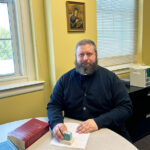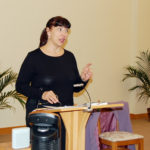By Ella Johnson
SAU Theological Perspective

At some point in my Catholic formation, I learned a type of examination of conscience that consisted of questions categorized by my relationship with God, others and self. I was taught to ask myself questions like: How have I sinned against God? How have I hurt others? How have I failed to love myself?
If I’m being honest, the questions in the third category puzzled me. The idea of self-love seemed to conflict with other values central to the Christian life, for example, self-sacrifice and redemptive suffering.
In fact, self-denial is the sole condition Jesus identifies for discipleship: “If anyone wishes to come after me, he must deny himself and take up his cross daily and follow me. For whoever wishes to save his life will lose it, but whoever loses his life for my sake will save it” (Luke 9:23-24). The call is to imitate Jesus, “Who, though he was in the form of God, did not regard equality with God something to be grasped. Rather, he emptied himself, taking the form of a slave, coming in human likeness, and found human in appearance, he humbled himself, becoming obedient to death, even death on a cross” (Phil. 2: 6-8).
In addition, the lives of saints, like Francis of Assisi and Mother Teresa of Calcutta, are held up to us as having exemplified these biblical words, by devoting their entire lives to the service of others. To borrow a line from Tina Turner, my question was, “What’s (self-) love got to do with it?”
Paul’s words to the Galatians are helpful in exploring this question: You were called to freedom, brothers and sisters; don’t let this freedom be an opportunity to indulge your impulses, serve each other through love. All the law has been fulfilled in a single statement: “You shall love your neighbor as yourself” (5:13-14).
Of course, my Christian life looks nothing like that of St. Francis or St. Teresa. But, I have sometimes felt like I’ve given to the point where I have not much left to give. As a parent, spouse and professor, I never need to go searching for opportunities to serve others.
Sometimes the needs of others around me are so pressing, I neglect my own needs to tend to theirs. I’m not saying this is cause for canonization! Rather, it gives me a laundry list of things to confess under the category of “How have I failed to love myself?” For instance: “Well, I haven’t slept enough or eaten right, so I got sick, threw out my back and was very grumpy to all those around me.” (Of course, this is purely hypothetical *wink emoji*).
In all seriousness though, I’ve been grappling with the hard lesson that loving others requires loving myself first.
As a colleague and friend of mine, Chanequa Walker-Barnes, puts it: “When we recognize our self as a sacred gift of God who is meant to be in relationship with other beings who are also wonderfully and beautifully made in the image of God, self-care becomes a fulfillment of the second part of the Great Commandment: ‘Love your neighbor as yourself.’ Self-care is self-love.”
This quotation is from Walker-Barnes’s book, “Sacred Self-Care: Daily Practices for Nurturing Our Whole Selves” (HarperOne, 2023). It is written as a seven-week devotional, perfect for (but not limited to) a Lenten practice, on the second part of the Great Commandment. It is based in Scripture and includes prayers, hymns and benedictions. (Walker-Barnes is even leading a virtual book-study this Lent, which can be accessed by subscribing to “No Trifling Matter” and checking “Lent Study.”) What I enjoy so much about the book is how Walker-Barnes shares about her own journey in self-care and draws from her theological training and her experience as a clinical psychologist and justice advocate.
The book has not only inspired me with a new theological perspective on self-love in the Christian life, it’s also given me some practical tools for setting healthy boundaries, caring for my emotions and nurturing my mind. I’m sharing about it here in case it might bless others in the way it has blessed me. The richest fruit I have received in God’s gift of healing my relationship with self has been deeper and more authentic relationships with others.
(Ella Johnson is associate professor in the Theology Department of St. Ambrose University in Davenport and director of General Education.)











